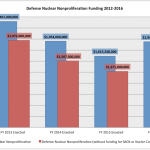
Sequestration, the budget mechanism that kicks in if and only if Congress does not budget to the caps set under the 2011 Budget Control Act, has been framed as the big bad wolf of Washington. But this frequent mischaracterization of sequestration as a vague, threatening entity neglects a key facet of budget construction: sequestration won’t kick in unless Congress fails to do its job.
Audit the Pentagon Act of 2015 — Answering the Question: How is the Taxpayer Dollar Spent?

This month, Representative Barbara Lee (D-Calif.) introduced the bipartisan Audit the Pentagon Act of 2015, (H.R. 942) co-sponsored by Mike Burgess (R-Texas) and five others. It aims to do exactly what it says: audit the Pentagon. Why, you ask? Because unlike every other federal agency required by law to undergo an audit, the Department of Defense (DoD) has never done so.
How Much are We Spending to Prevent Nuclear Terrorism?
The Obama administration has requested $12.6 billion for the National Nuclear Security Agency (NNSA) as part of its Fiscal Year 2016 Department of Energy budget request. $1.9 billion of that request will go towards Defense Nuclear Non-Proliferation (DNN) programs tasked with preventing the spread of nuclear weapons and materials. The programs facilitate cooperation with international partners to better secure, monitor, and dispose of vulnerable nuclear material (military and civilian) and other radiological waste.
Weapons Acquisition and Contract Management Make GAO’s High Risk List – Again

Last week, the U.S. Government Accountability Office released its biennial update to its High Risk List – a compilation of government programs that are identified as “high risk due to their greater vulnerabilities to fraud, waste, abuse, and mismanagement or the need for transformation to address economy, efficiency, or effectiveness challenges.” Department of Defense weapon systems acquisition and Department of Energy contract management have both been on the GAO’s High Risk List for the last 25 years.
Factsheet: FY 2016 Defense Nuclear Non-Proliferation Budget Request
By Greg Terryn and Sarah Tully Since 2004, the NNSA’s nuclear non-proliferation programs have facilitated the removal of all weapons-grade highly enriched uranium (HEU) from 17 countries—165 bombs worth of nuclear material. Nevertheless, “nearly 2,000 metric tons of weapons-usable nuclear materials remain spread across hundreds of sites around the globe,” according to the Nuclear Threat […]

